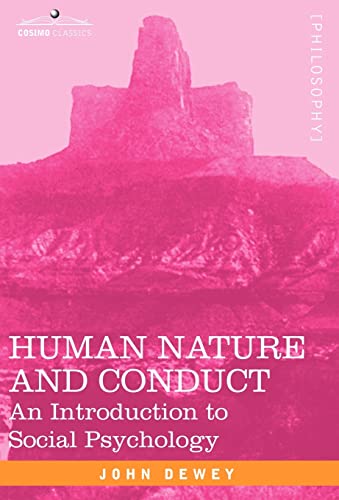Verwandte Artikel zu Human Nature and Conduct: An Introduction to Social...
Human Nature and Conduct: An Introduction to Social Psychology (Cosimo Classics Philosophy) - Hardcover

Inhaltsangabe
The problem with morality, according to Pragmatist John Dewey, is that it assumes an inherent lacking in human nature and then seeks, through constraining rules, punishment, and threat, to make humans act differently-act against their nature. This, he claims, is a battle doomed to fail. In Human Nature and Conduct, first published in 1922, Dewey brings the rigor of natural sciences to the quest for a better moral system. By studying habit, impulse, and intelligence, he arrives at a morality that is firmly rooted the context of the world, accounting for thinking humans with individual circumstances that do, indeed, make a difference when determining right and wrong. Students of sociology, philosophy, and psychology will be interested to see moral judgment investigated as a scientific question by one of America’s most influential philosophers.American educator and philosopher JOHN DEWEY (1859-1952) helped found the American Association of University Professors. He served as professor of philosophy at Columbia University from 1904 to 1930 and authored numerous books, including The School and Society (1899), Experience and Nature (1925), Experience and Education (1938), and Freedom and Culture (1939).
Die Inhaltsangabe kann sich auf eine andere Ausgabe dieses Titels beziehen.
Reseña del editor
The problem with morality, according to Pragmatist John Dewey, is that it assumes an inherent lacking in human nature and then seeks, through constraining rules, punishment, and threat, to make humans act differently-act against their nature. This, he claims, is a battle doomed to fail. In Human Nature and Conduct, first published in 1922, Dewey brings the rigor of natural sciences to the quest for a better moral system. By studying habit, impulse, and intelligence, he arrives at a morality that is firmly rooted the context of the world, accounting for thinking humans with individual circumstances that do, indeed, make a difference when determining right and wrong. Students of sociology, philosophy, and psychology will be interested to see moral judgment investigated as a scientific question by one of America's most influential philosophers. American educator and philosopher JOHN DEWEY (1859-1952) helped found the American Association of University Professors. He served as professor of philosophy at Columbia University from 1904 to 1930 and authored numerous books, including The School and Society (1899), Experience and Nature (1925), Experience and Education (1938), and Freedom and Culture (1939).
„Über diesen Titel“ kann sich auf eine andere Ausgabe dieses Titels beziehen.
Neu kaufen
Diesen Artikel anzeigenEUR 13,82 für den Versand von Vereinigtes Königreich nach USA
Versandziele, Kosten & DauerSuchergebnisse für Human Nature and Conduct: An Introduction to Social...
Human Nature and Conduct: An Introduction to Social Psychology (Cosimo Classics Philosophy)
Anbieter: Ria Christie Collections, Uxbridge, Vereinigtes Königreich
Zustand: New. In. Artikel-Nr. ria9781605200019_new
Anzahl: Mehr als 20 verfügbar
Human Nature And Conduct: An Introduction to Social Psychology
Anbieter: Revaluation Books, Exeter, Vereinigtes Königreich
Hardcover. Zustand: Brand New. 336 pages. 8.50x5.75x1.00 inches. In Stock. Artikel-Nr. x-1605200018
Anzahl: 2 verfügbar
HUMAN NATURE AND CONDUCT
Anbieter: moluna, Greven, Deutschland
Zustand: New. KlappentextrnrnThe problem with morality, according to Pragmatist John Dewey, is that it assumes an inherent lacking in human nature and then seeks, through constraining rules, punishment, and threat, to make humans act differently-act against t. Artikel-Nr. 4236284
Anzahl: Mehr als 20 verfügbar
Human Nature and Conduct : An Introduction to Social Psychology
Anbieter: AHA-BUCH GmbH, Einbeck, Deutschland
Buch. Zustand: Neu. Neuware - The problem with morality, according to Pragmatist John Dewey, is that it assumes an inherent lacking in human nature and then seeks, through constraining rules, punishment, and threat, to make humans act differently-act against their nature. This, he claims, is a battle doomed to fail.In Human Nature and Conduct, first published in 1922, Dewey brings the rigor of natural sciences to the quest for a better moral system. By studying habit, impulse, and intelligence, he arrives at a morality that is firmly rooted the context of the world, accounting for thinking humans with individual circumstances that do, indeed, make a difference when determining right and wrong.Students of sociology, philosophy, and psychology will be interested to see moral judgment investigated as a scientific question by one of America's most influential philosophers.American educator and philosopher JOHN DEWEY (1859-1952) helped found the American Association of University Professors. He served as professor of philosophy at Columbia University from 1904 to 1930 and authored numerous books, including The School and Society (1899), Experience and Nature (1925), Experience and Education (1938), and Freedom and Culture (1939). Artikel-Nr. 9781605200019
Anzahl: 1 verfügbar

